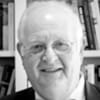
Angus Deaton
The writer is Professor of Economics and International Affairs at Princeton University's Woodrow Wilson School of Public and International Affair. He is the 2015 Nobel laureate in economics. He is author of The Great Escape: Health, Wealth, and the Origins of Inequality.



